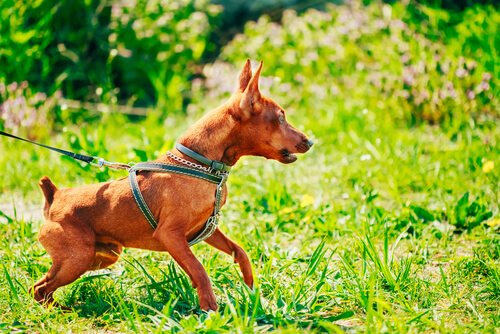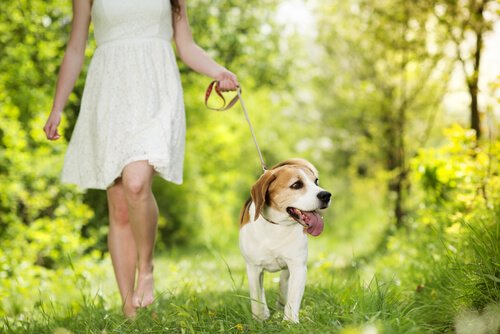5 Different Dog Personalities
4 minutes

Just like people, pets have behaviors that define their personality. Knowing different dog personalities can be important when it comes to choosing the ideal breed for you.
An animal’s temperament says a lot about his behavior. In other words, the dog reveals a lot regarding the way he reacts to different stimuli in the environment, as well as his adaptability to his new home.
When you have clear picture about a dog’s personality, you can predict if he’ll get along with a certain owner. Ideally, you’ll want to have a harmonious relationship that provides companionship and a healthy living environment.
5 Dog Personalities
There are five types of temperaments that are very common in dogs — although they are not the only factor that defines a dog’s personality — they do define a large part of the animal’s behavior.

The first thing to know is that most dog personalities are based on genetics, although discipline and training do help correct and control impulses.
1. Aggressive dogs
They are naturally confident and impulsive. This personality type is common in breeds such as Rottweiler, Doberman and German Shepherd. There are two important factors when it comes to an aggressive dog. The first factor is that you must identify is that if it’s part of the dog’s personality and it’s a learned behavior.
The other factor is the owner. Aggressive dogs are usually very dominant, so they need an owner who has a strong character, someone with the ability to show him who’s boss. He needs to be able to impose himself on the dog and show him who is in charge.
Training can have a great influence on this personality type. Either you can reinforce a dog’s aggressive behavior, or you can soften it. For the most part, that will depend on a dog’s environment and his owner. In order to eliminate some of his aggression, this type of dog needs a lot of physical activity and exercise.
2. Shy dogs.
Unlike other dog personalities, shyness can be acquired. Although there are genetic factors play a roll, some dogs become shy because of trauma or lack of socialization. This type of personality is common in dogs that have been isolated, or have had little contact with people. It also occurs in dogs that have lived with other, more dominant breeds.
3. Passive-aggressive dogs.
Dogs are known to have a passive-aggressive personality when they respond impulsively to frightening situations. In general, shy dogs hide or flee when they feel afraid. If he is predisposed to do so, a passive-aggressive animal sees aggression as a way to put an end to his fear.
This personality type can be due to bad crossbreeding of dog personalities. In other words, an aggressive dog is bred with a shy one. This is a common mistake that many inexperience breeders make.
Relationship with their environment
4. Like other dog personalities, sociability is hereditary, which means many animals are friendly and affectionate because of their breed. These dogs show their personality around people, dogs or animals. Their personality makes them are ideal for households that have children or older people.
5. Independent dogs have no interest in showing affection and care. They aren’t interested in coexisting, and therefore don’t need much affection from their owners. They usually seek attention only when they want it or need it. The rest of the time, they prefer a solitary lifestyle.

Although this type of dog personality isn’t very common, some owners prefer it. As it turns out, these dogs are perfect for people who spend the whole day away from home or travel often.
How to choose the ideal personality type
When you have decided to have a dog as a pet, it’s advisable to choose one according to your personality. This will help him establish a closer and more empathetic relationship with his owner. Small dogs are ideal for people with fast-paced lives. Usually these dogs don’t require long walks or much care.
On the contrary, if you are an inactive person, it’s better to have a quiet dog with an independent personality. If the dog is well trained, he won’t require long walks, because they know the rules of the house.
For athletes, large and active dogs are the best choice such as Golden Retriever or a Labrador. Also, a German shepherd is a great alternative. Another way to choose the best breed is to consider the jobs that will be assigned to the animal. If he’s to be a watchdog, his personality must be aggressive, while family dogs must be sociable by nature.
Main image source: Ted Murphy
All cited sources were thoroughly reviewed by our team to ensure their quality, reliability, currency, and validity. The bibliography of this article was considered reliable and of academic or scientific accuracy.
- Pawloski, A. A., & Scott, J. P. (1956). Hereditary differences in the development of dominance in litters of puppies. Journal of Comparative and Physiological Psychology, 49(4), 353.
- Ilska, J., Haskell, M. J., Blott, S. C., Sánchez-Molano, E., Polgar, Z., Lofgren, S. E., … & Wiener, P. (2017). Genetic characterization of dog personality traits. Genetics, 206(2), 1101-1111.
- Kubinyi, E., Turcsán, B., & Miklósi, Á. (2009). Dog and owner demographic characteristics and dog personality trait associations. Behavioural processes, 81(3), 392-401.
